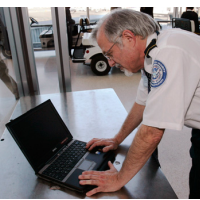Obama Homeland Security Says Reasonable Suspicion not Needed for Laptop and Cellphone Searches…Hunches Good Enough
 (photo: Mike Derer, AP)
(photo: Mike Derer, AP)
Crossing the border to enter or leave the U.S. can mean border agents legally searching, and even confiscating, a person’s laptop, cell phone and other electronic devices—solely on the grounds of having a “hunch” that something may be amiss.
This policy comes from the Department of Homeland Security (DHS), which revealed in a December 2011 internal study that agents with Customs and Border Protection and the Immigration and Customs Enforcement have seized Americans and others’ possession without any real suspicion of wrongdoing or possible threat.
The study only came to light after the Associated Press and the American Civil Liberties Union (ACLU) obtained copies of it through the Freedom of Information Act.
Contents of the 23-page report provided “a rare glimpse of the Obama administration’s thinking on the long-standing but controversial practice of border agents and immigration officers searching and, in some cases holding for weeks or months, the digital devices of anyone trying to enter the U.S.,” wrote Anne Flaherty for the Associated Press.
In March, the U.S. Court of Appeals for the Ninth Circuit ruled that border agents must have at least a “reasonable suspicion” of criminal wrongdoing in order to seize electronic devices and perform forensic examinations of them—the first court to apply any restriction to the so-called “border exception” to the Fourth Amendment.
As far as the DHS is concerned, however, the border searches do not violate the First or Fourth amendments, which prohibit restrictions on speech and unreasonable searches and seizures.
The ACLU called the DHS policy disappointing, if not alarming.
“To be sure, rummaging around through people’s personal papers may well turn up the occasional bad guy, but that is not the only consideration. No doubt law enforcement agents would also find it useful to walk into people's homes at will, but we don't allow them to do so because that would intrude on our reasonable expectation of privacy in our homes,” Brian Hauss, legal fellow with the ACLU’s Speech, Privacy and Technology Project, wrote.
“And just as we reasonably expect privacy in our homes, so, too, do we expect that border agents will not base their decisions to search through our electronic information on a whim or a hunch. Put another way, requiring law enforcement agents to possess objective reasons for a search is a feature of our constitutional framework, not a bug,” Hauss added.
-Noel Brinkerhoff
To Learn More:
DHS Releases Disappointing Civil Liberties Report on Border Searches of Laptops and Other Electronics (by Brian Hauss, American Civil Liberties Union)
DHS: A Hunch Is Enough for Searching Your Laptop (by Anne Flaherty, Associated Press)
Border Searches of Electronic Devices (Department of Homeland Security) (pdf)
Federal Court Limits Cell Phone and Laptop Searches Near Border (by Matt Bewig, AllGov)
Homeland Security Approves Seizure of Cell Phones and Laptops within 100 Miles of Border; Report Remains Secret (by Matt Bewig, AllGov)
Homeland Security to begin Scanning Prepaid Payment Cards of Arriving Travelers (by Noel Brinkerhoff, AllGov)
- Top Stories
- Unusual News
- Where is the Money Going?
- Controversies
- U.S. and the World
- Appointments and Resignations
- Latest News
- Trump Orders ICE and Border Patrol to Kill More Protestors
- Trump Renames National Football League National Trump League
- Trump to Stop Deportations If…
- Trump Denounces World Series
- What If China Invaded the United States?






Comments